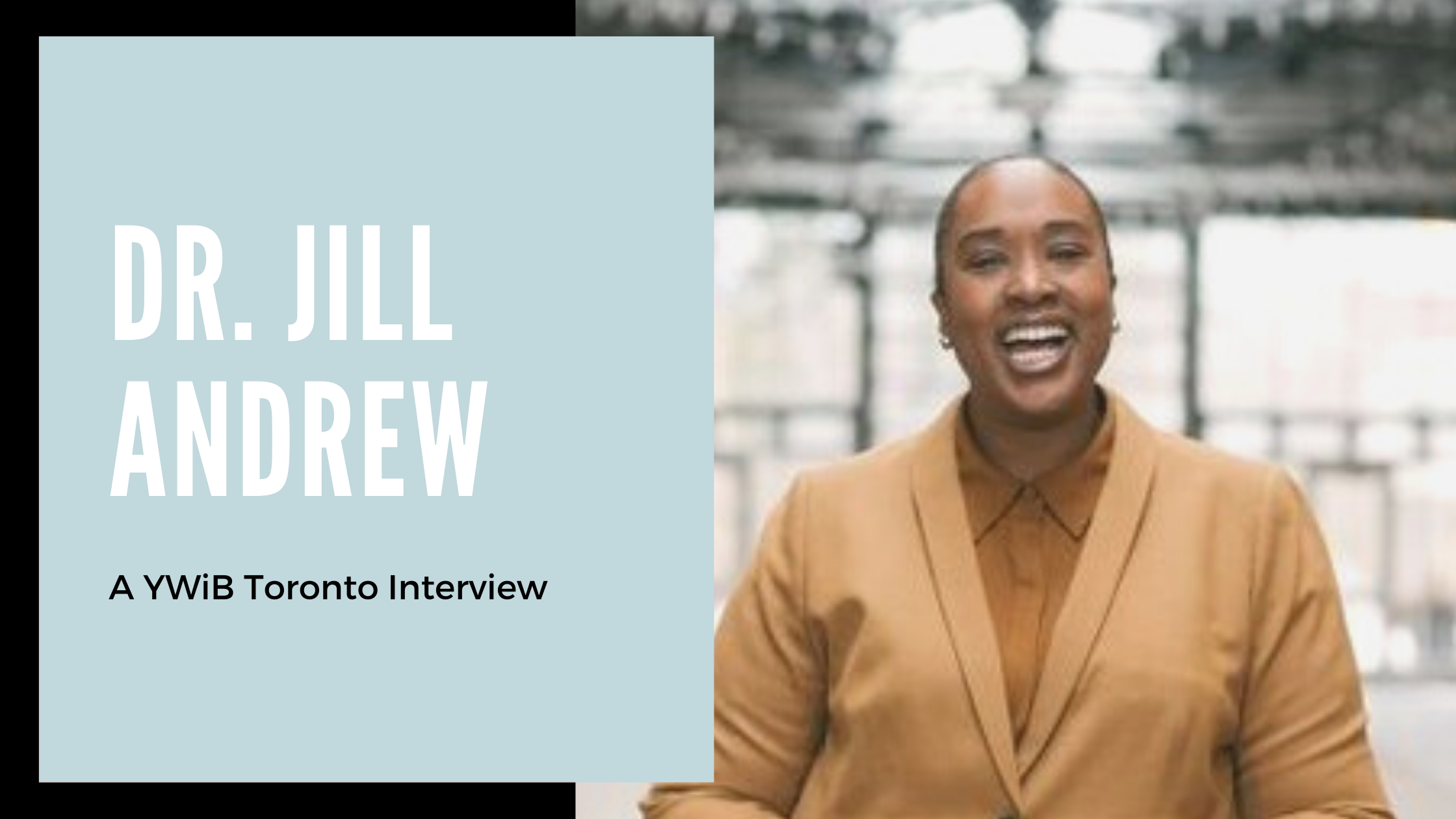A Leader in the Pandemic: Dr. Jill Andrew on community voices, health, and body equity as a first-time politician.
/Young Women in Business Toronto (YWiB) aims to provide our diverse community of young, self-identified women with genuine career advice, encouragement, and examples of local role models. That's why we’re continuing our Role Model series in 2021. Join us in highlighting career professionals, entrepreneurs, and other remarkable women that our community can be inspired by and learn from.
Dr. Jill Andrew, PhD, MPP Toronto-St. Paul’s Ontario NDP Critic for Culture and Women’s Issues (she/her)
Dr. Andrew, tell us about yourself and your career!
I have worn many hats over my career- working as a child & youth worker, teacher’s assistant, high school teacher, equity advisor, journalist, instructor, makeup artist, and now also a first-time politician. I’m also the community co-owner of Glad Day Bookshop – the world’s oldest LGBT bookstore. Throughout all of these career opportunities, I’ve had to be creative, hardworking, a storyteller, advocate, and a problem-solver.
I am currently;
Supporting my constituents as they process pandemic-related family loss and grief.
Representing residents and workers of LTC homes and pushing for safer conditions, especially during the COVID-19 pandemic.
Pushing for a gender-based strategy and analysis of COVID’s impact on LTC and other essential workers, educators, small business owners.
Advocating for paid sick days; for our arts artists many of who have experienced income precarity long before COVID-19
Body equity and better awareness and access to care, mental health supports for individuals suffering from eating disorders.
Acting as a critic for Culture & Heritage and Women's Issue for the Official Opposition
Serving on the NDP Black Caucus, as well as the Standing Committee on Public Accounts.
My career to date has focused on community; supporting and amplifying the voices of great humans. I’m also obsessed with cats.
Who has been your biggest source of inspiration and strength?
There are so many people I could mention, but my Mom will always rise to the top of the list. She’s the first superhero I ever met, and the first person I witnessed working hard to fulfill my basic needs and making me feel good. She taught me about life’s inequities and how to navigate the systemic barriers that face Black women. Growing up as a Black child who didn’t come from economic privilege, I’ve learned and continue to draw from the positive example she set.
I’m also grateful for the support of my mentors and prior employers who I have been able to lean on when times get tough.
You are an advocate for your community, which includes several long-term care homes (LTCs) currently experiencing COVID-19 outbreaks. What has it been like to be a leader during this pandemic? What have you learned about yourself?
I’ve tapped into strength I didn’t know I had. I’ve learned to work through fear. It’s been scary, especially during the pandemic, and at times, I’ve felt afraid and saddened. And that’s just me… imagine being the person who has lived through the experience of losing their child, parent, or spouse.
I’ve had a generous, front-row seat in advocating for people; personal support workers, long-term care workers, and others employed in the fight of COVID-19.
You may have read the military’s report about the horrific conditions in some of Ontario’s LTC homes and lack of staff. I’ve had an opportunity to speak with residents, families, and staff. Some have survived, some haven’t. I met a gentleman who likened the situation to warehousing of humans... forgotten about by society, left at the end of a hallway.
My constituents are asking for; more staff, more infection control centres, better client-to-staff ratios. Essentially, these folks want care to be safe and given with dignity. I need to fight for them to feel heard and for change.
Do you have any advice for women in our community who might be considering entering politics? Were there any skills or knowledge gaps you had to address before entering the sector?
Advice: Remember that you’re not alone. I really want people to know that - especially women, women of colour, Black, Trans, individuals with disabilities, and other marginalized communities. You are not alone, and you have a right to be in the political sphere. We are advocating for you, but we also need more representation so we can better address and remove racism and white supremacy from our society. Sadly, our lived-experiences will not impact legislation if no one is forcing difficult conversations.
You can make change by running for office, but also by talking about politics with your community and urging your local representatives to make change. Remember, politicians are hired to work for you.
Skills or knowledge: I don’t have a political science degree, and I’m not a lawyer. Instead, I have a Child & Youth Worker diploma, Master’s Degree in Women & Gender Studies from the University of Toronto, and a PhD from York University.
My education definitely influences my work, but it does take time to pick up the jargon and vernacular of the political realm. Connect with local politicians, activists, and policy advisors. Have conversations with them about their work, how to prepare yourself, what to expect. I did this before I decided to run. I draw from my previous career experience and came to politics with eyes wide open.
The number one thing you need is fire - be pissed off or excited about something(s) that impact your community or any community you subscribe to and be ready to do something about it!
You are also passionate about body equity. As this might be a newer concept for some of our community, can you share an example of how you disrupt sizeism through your work and advocacy?
Body equity is fair access to care and rights regardless of the characteristics of our physical bodies.. Fatphobia in medical care, such as a doctor seeing a patient’s weight as the primary or only concern that needs to be addressed, is an example of a body equity issue.
I am working to see a universal “health at every size” approach to health care, education, and policy. Care that is weight and height neutral is more inclusive and leads to better outcomes, especially if patients feel safe enough to access regular and required care.
Body equity relates to discirmination towards any or all aspects of our bodies. The Ontario Human Rights Code (OHRC) recognizes race, gender, sexual orientation and other necessary protected grounds, but not body size and physical appearance. Every person in Ontario should have protection from verbal, physical, economic or emotional abuse related to the size, shape, weight, height and appearance of their body. I’ve been raising awareness and pushing for appearance-based protection for many years.
What is Body Confidence Canada (BCC), and how can our community get involved or support this initiative?
I’m also the co-founder of #SizeismSUCKS and Body Confidence Canada, which “strives to create an enhanced socio-cultural environment where all bodies can not only survive but thrive without fear of discrimination”. Along with progressive programming, community engagement, consulting and research, BCC hosts the annual Body Confidence Canada Awards (BCCAs).
You can learn more and get in contact via our website.
Eating Disorders Awareness Week in Ontario was observed for the first time from February 1 to 7, 2021. What is Bill 61 and why were you passionate about ensuring it is passed into law?
Did you know that in 2016, there were an estimated one million people suffering from eating disorders in Canada? Eating disorders (ED) have the highest mortality rates of any mental illness, yet ED and mental health treatment in Ontario is underfunded and inaccessible to many who are struggling.
Eating disorders have been historically stereotyped as women’s issues... specifically white women’s issues. We need to expand our understanding of eating disorders and how they affect our communities. Youth especially need more education about body equity and eating disorders, as well as better access to treatment and supports.
I championed the successful Bill 61, which installed Eating Disorders Awareness Week in Ontario. I’ve also partnered with the Toronto District School Board since 2017 to bring more awareness and education initiatives.
Read more about Bill 61 here: https://www.ontariondp.ca/news/mpps-eating-disorders-awareness-week-bill-passes
What has been your proudest accomplishment to date?
Bill 61 was my first private members bill and I’m really proud to say it became law as of December 8, 2020. This was the culmination of hard work by some organizations, constituents, and people across Ontario who emailed, called, and wrote-in with their support. Many patients, survivors and their families, and health-care professionals shared their lived and close experiences with eating disorders.
I will continue to push for increased funding, resources, training, and research to ensure ED policies and programs reflect the diversity of impacted voices and their needs.
I’m also working to see the adoption and full implementation of an Interministerial Intersectional Gender Equity Strategy, which would “require proposed legislation be reviewed through an intersectional gender lens before it becomes law to ensure the impact of said legislation on women, gender diverse and racialized Ontarians is comprehensively weighed, accounted for and made public.”
Read more: https://nowtoronto.com/news/ontario-feminist-recovery-plan-coronavirus
What excites you about the future?
It’s a little cliche, but I like to remember that “this too shall pass”. I strongly believe that in the next election, the people of Ontario will remember what happened during the pandemic. They will want better for their families, communities, and themselves. COVID has exposed the population to the impact of inequalities and cracks in our system- which many of us have been talking about for years. I see a brighter day coming, with
paid sick days for workers
safer conditions in LTC for staff and residents
more equitable and fair education
Better and more accessible public transportation
more support for transport workers
more accessible mental health and ED supports
no housing crisis (or us being close to solving it)
Addressing the income precarity of gig economy workers and especially artists and many cultural workers
more adequate support for people living on ODSP, Ontario Workers, or otherwise below the poverty line.
I see the potential for so much more the days ahead. Let’s work together to create a safer, more equitable society for everyone.
Connect with Dr. Jill Andrew: jillandrewmpp.ca Twitter: @JillsLastWord
Facebook; JillAndrewTO| Instagram: @JillsLastWord


